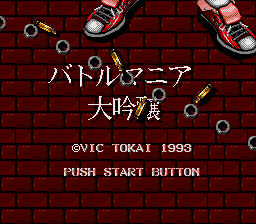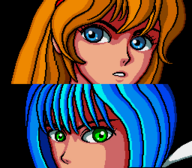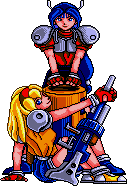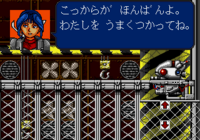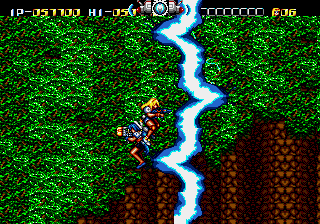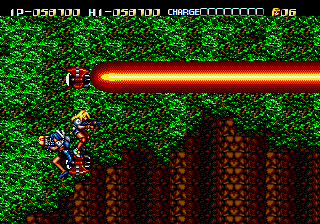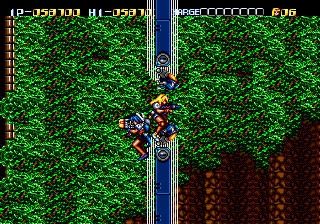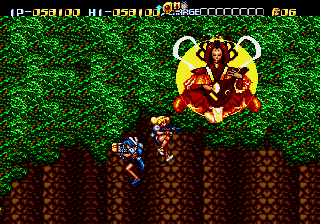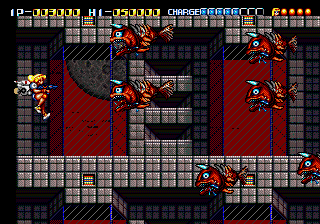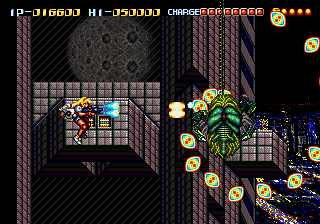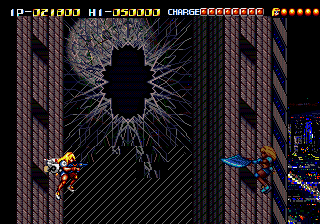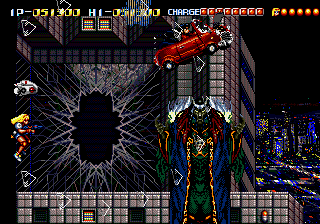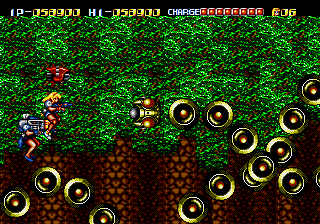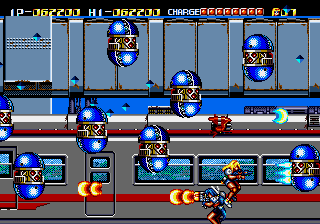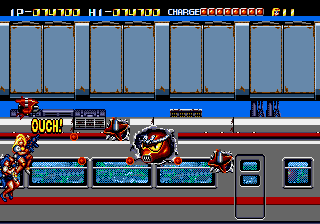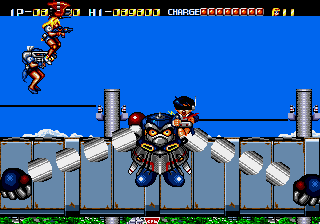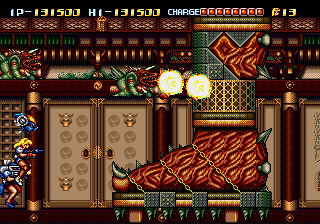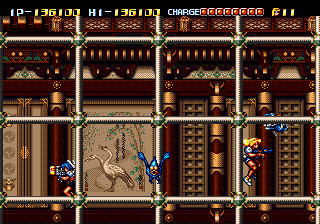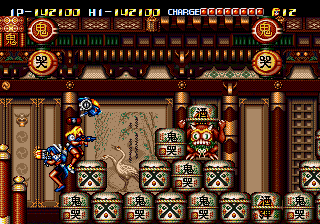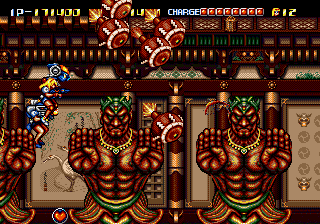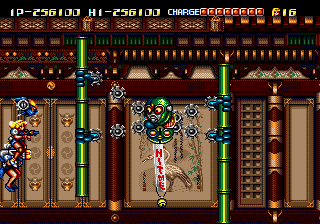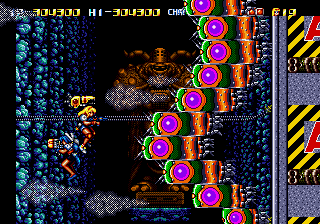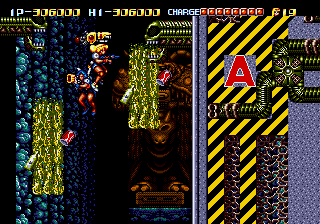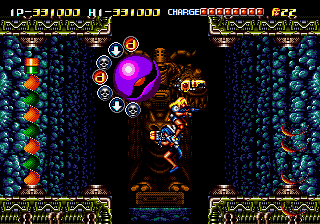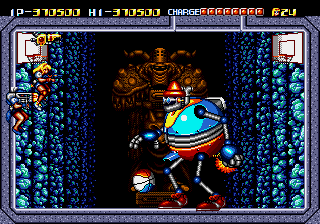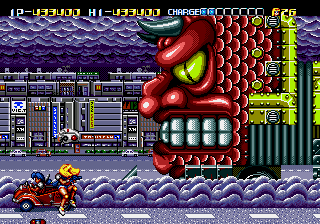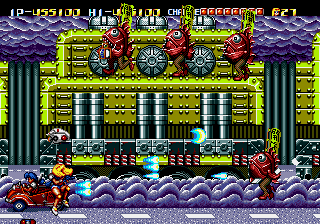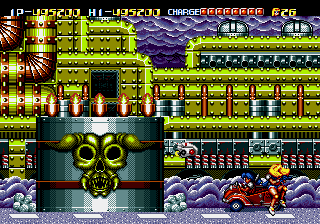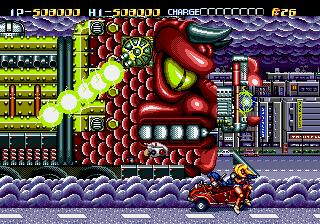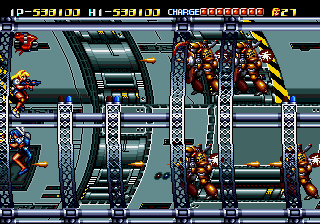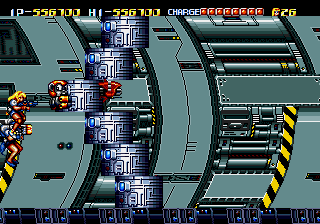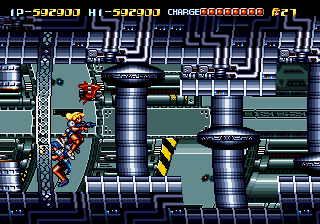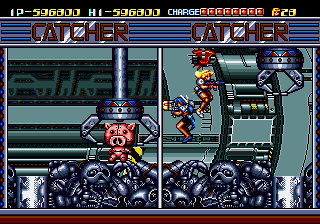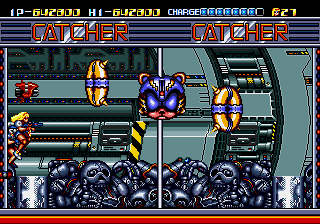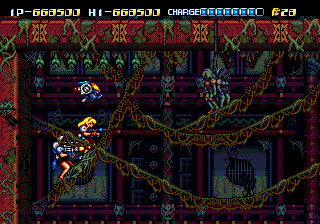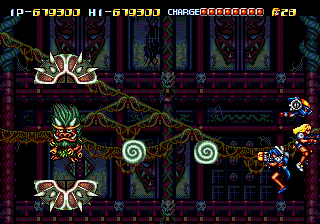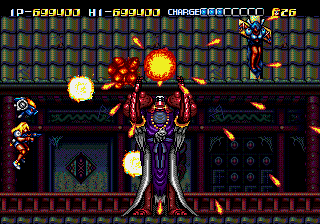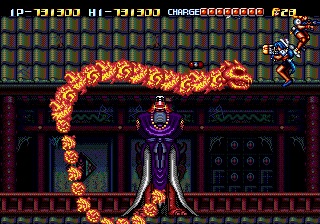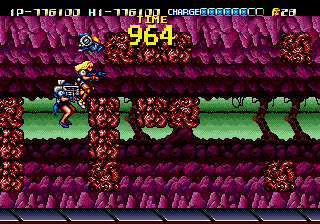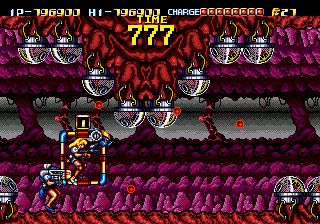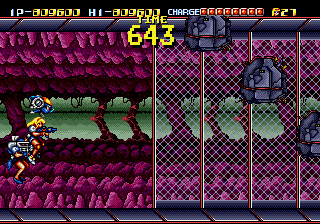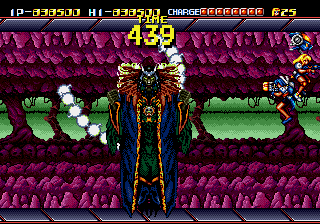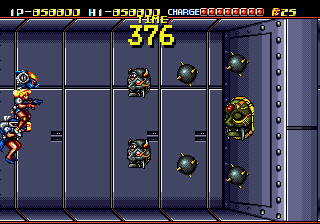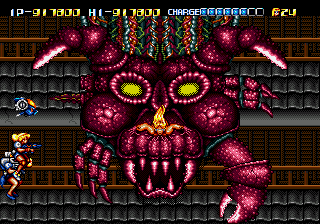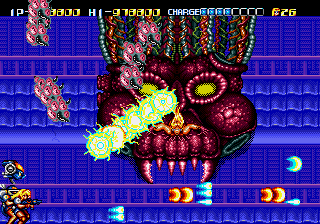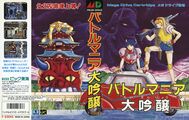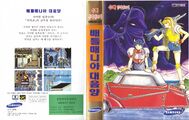Difference between revisions of "Battle Mania Daiginjou"
From Sega Retro
(added sprite) |
|||
| Line 33: | Line 33: | ||
Call us anytime<br> | Call us anytime<br> | ||
Yes, we are open 24 hours!|Introduction|ref={{fileref|Battle Mania Daiginjou, Quote.png}}}} | Yes, we are open 24 hours!|Introduction|ref={{fileref|Battle Mania Daiginjou, Quote.png}}}} | ||
| − | The assassin cult Kikokukyou have resurrected Morgstein (モルグスティン), the antagonist of the original game. He wants to transplant Mania's battle-addled mind into the computer of the Kikoku Tank. The Trouble Shooters, Mania Ohtorii (大鳥居マニア) and Maria Haneda (羽田マリア), must stop him and destroy Kikokukyou | + | The assassin cult Kikokukyou (鬼哭教) have resurrected Morgstein (モルグスティン), the antagonist of the original game. He wants to transplant Mania's battle-addled mind into the computer of the Kikoku Tank. The Trouble Shooters, Mania Ohtorii (大鳥居マニア) and Maria Haneda (羽田マリア), must stop him and destroy Kikokukyou and its mysterious leader Kikokusai (キコクサイ). |
==Gameplay== | ==Gameplay== | ||
| + | [[File:Battle Mania Daiginjou, Mania and Maria.png|left]] | ||
{{ScreenThumb|Battle Mania Daiginjou, Booster Select.png|width=200|Power booster selection}} | {{ScreenThumb|Battle Mania Daiginjou, Booster Select.png|width=200|Power booster selection}} | ||
The game is a side-scrolling shooter like its predecessor. Mania and Maria fly using jetpacks. The player controls Mania and can move her in any direction using the D-Pad. She shoots her primary weapon with {{B}}, which can be held for rapid-fire. Maria follows Mania and fires when she fires. Maria's weapon starts fairly strong but cannot be upgraded, whereas Mania's weapon is initially comparatively weak but can be upgraded by finding power-up items. Both characters can neutralize enemy projectiles with their own. | The game is a side-scrolling shooter like its predecessor. Mania and Maria fly using jetpacks. The player controls Mania and can move her in any direction using the D-Pad. She shoots her primary weapon with {{B}}, which can be held for rapid-fire. Maria follows Mania and fires when she fires. Maria's weapon starts fairly strong but cannot be upgraded, whereas Mania's weapon is initially comparatively weak but can be upgraded by finding power-up items. Both characters can neutralize enemy projectiles with their own. | ||
| Line 197: | Line 198: | ||
==History== | ==History== | ||
===Legacy=== | ===Legacy=== | ||
| − | Translation group [[M.I.J.E.T.]] translated the game's dialogue text to English and included it with their ''[[Tougi Ou King Colossus]]'' patch as an extra before | + | Translation group [[M.I.J.E.T.]] translated the game's dialogue text to English and included it with their ''[[Tougi Ou King Colossus]]'' patch as an extra before releasing it separately later.{{ref|http://mijet.eludevisibility.org/BattleMania2/BattleMania2.html}} |
==Production credits== | ==Production credits== | ||
Revision as of 06:16, 5 June 2023
| Battle Mania Daiginjou | |||||||||||||||
|---|---|---|---|---|---|---|---|---|---|---|---|---|---|---|---|
| System(s): Sega Mega Drive | |||||||||||||||
| Publisher: VIC Tokai | |||||||||||||||
| Developer: VIC Tokai, Graphic Research (sound) | |||||||||||||||
| Genre: Shooting[1][2] | |||||||||||||||
| Number of players: 1 | |||||||||||||||
|
Battle Mania Daiginjou (バトルマニア大吟醸), sometimes referred to as Battle Mania 2, is a shoot-'em-up developed and published by VIC Tokai in 1993 for the Sega Mega Drive exclusively in Japan and South Korea. It is the sequel to Battle Mania (which was released in the US as Trouble Shooter).
The ROM header's international title field calls the game Trouble Shooter Vintage, which is another name commonly used for the game. This may have been the intended name had the game been released overseas. "Vintage" has a similar meaning for wine as "daiginjou" does for sake.
Contents
Story
| “ | Trouble Shooters... Lonesome hunters at heart... We never sleep |
„ |
— Introduction[3] | ||
The assassin cult Kikokukyou (鬼哭教) have resurrected Morgstein (モルグスティン), the antagonist of the original game. He wants to transplant Mania's battle-addled mind into the computer of the Kikoku Tank. The Trouble Shooters, Mania Ohtorii (大鳥居マニア) and Maria Haneda (羽田マリア), must stop him and destroy Kikokukyou and its mysterious leader Kikokusai (キコクサイ).
Gameplay
The game is a side-scrolling shooter like its predecessor. Mania and Maria fly using jetpacks. The player controls Mania and can move her in any direction using the D-Pad. She shoots her primary weapon with ![]() , which can be held for rapid-fire. Maria follows Mania and fires when she fires. Maria's weapon starts fairly strong but cannot be upgraded, whereas Mania's weapon is initially comparatively weak but can be upgraded by finding power-up items. Both characters can neutralize enemy projectiles with their own.
, which can be held for rapid-fire. Maria follows Mania and fires when she fires. Maria's weapon starts fairly strong but cannot be upgraded, whereas Mania's weapon is initially comparatively weak but can be upgraded by finding power-up items. Both characters can neutralize enemy projectiles with their own.
There are three control schemes, which can be chosen in the Options before starting the game. The 1-way control scheme is the same as the original game. Mania always faces to the right, but Maria can face either direction and flips around with ![]() . This scheme allows Mania and Maria to face opposite directions and cover both sides, which can be useful because enemies enter from both sides. The 2-way control scheme allows Mania to flip around with
. This scheme allows Mania and Maria to face opposite directions and cover both sides, which can be useful because enemies enter from both sides. The 2-way control scheme allows Mania to flip around with ![]() also, so that Mania and Maria always face the same direction. This gives them stronger fire in both directions but only lets them cover one side at a time. Finally, the 8-way control scheme allows Mania to fire in eight directions (the four cardinal directions and the four intermediate directions). She aims by pointing the D-Pad in any direction while she is not firing. Her aim is fixed as long as she is firing. Maria still shoots only horizontally and flips around with
also, so that Mania and Maria always face the same direction. This gives them stronger fire in both directions but only lets them cover one side at a time. Finally, the 8-way control scheme allows Mania to fire in eight directions (the four cardinal directions and the four intermediate directions). She aims by pointing the D-Pad in any direction while she is not firing. Her aim is fixed as long as she is firing. Maria still shoots only horizontally and flips around with ![]() .
.
Before the first seven stages, the player is given a choice of power booster. This is a drone that follows the pair and provides a Super Weapon. After collecting two Power Up items, the drone also provides additional support fire. The drone usually follows Mania and Maria closely, but its behavior can be changed in the Options to revolve around the pair or fly in the opposite direction as them.
Super Weapons are powerful special abilities that can be used with ![]() when the player's charge bar is full. The bar charges automatically; it charges quickly, so Super Weapons can be used multiple times per stage. If the player presses
when the player's charge bar is full. The bar charges automatically; it charges quickly, so Super Weapons can be used multiple times per stage. If the player presses ![]() before the charge bar is ready, it resets.
before the charge bar is ready, it resets.
Maria is invulnerable, but if Mania dies once, the game is over and the player must use a continue. There is no way to earn additional continues. Mania dies if she loses all of her health points or gets crushed between a fixed object and the screen as it scrolls. Mania gains an extra health point every 20,000 points earned and by finding heart items. There is no limit to the number of health points that she can gain.
The game's story is conveyed through cutscenes before and after stages. The dialogue often gives hints about the upcoming stage. Like the original game, the tone is lighthearted and includes self-referential humor.
The game has a Score Attack mode that offers the player additional challenges to complete.
Super Weapons
| Neo-Thunder (ネオサンダー) | |
|---|---|
| Two lightning bolts sweep out to the sides of the screen. | |
| Eraser (イレイサー) | |
| Two horizontal lasers that reach to the end of the screen. | |
| Chainsaw (チェインソー) | |
| Two chainsaw blades that extend vertically. | |
| Benten Bomb (ベンテンボム) | |
| A bombardment rotating around Mania. |
Items
| Cargo Drone | |
|---|---|
| Shoot down to release an item, then fly over to collect. | |
| Speed Up | |
| Increases Mania's movement speed. | |
| Speed Down | |
| Decreases Mania's movement speed. | |
| Power Up | |
| Increases the power of Mania's weapon. The power of her weapon is maintained from stage to stage unless Mania dies. | |
| Life Up | |
| Gives Mania another health point. There is no limit to the number of health points that Mania can have. | |
| Bonus Points | |
| Awards the player with 100 bonus points. |
Stages
| Stage 1 | |
|---|---|
| Mania plays this stage by herself since Maria is still asleep. | |
| Stage 2 | |
| Stage 3 | |
| Stage 4 | |
| Stage 5 | |
| Mania and Maria use their car instead of their jetpacks for this stage. Mania controls similarly to the 8-way control scheme, with the D-Pad aiming when she is not firing. Maria is unavailable for support fire as she is driving the car. | |
| Stage 6 | |
| Stage 7 | |
| Stage 8 | |
| Stage 9 | |
History
Legacy
Translation group M.I.J.E.T. translated the game's dialogue text to English and included it with their Tougi Ou King Colossus patch as an extra before releasing it separately later.[4]
Production credits
| This article needs a list of production credits, either from the game itself, a manual, or other reliable source. Source: Battle Mania Daiginjou MD credits.pdf |
Magazine articles
- Main article: Battle Mania Daiginjou/Magazine articles.
Physical scans
| Sega Retro Average | |||||||||||||||||||||||||||||||||||||||
|---|---|---|---|---|---|---|---|---|---|---|---|---|---|---|---|---|---|---|---|---|---|---|---|---|---|---|---|---|---|---|---|---|---|---|---|---|---|---|---|
|
| 69 | |
|---|---|
| Based on 7 reviews | |
Technical information
- Main article: Battle Mania Daiginjou/Technical information.
References
- ↑ File:BattleMania2 MD JP Box.jpg
- ↑ 2.0 2.1 https://sega.jp/history/hard/megadrive/software_l.html (Wayback Machine: 2020-07-02 23:21)
- ↑ File:Battle Mania Daiginjou, Quote.png
- ↑ http://mijet.eludevisibility.org/BattleMania2/BattleMania2.html
- ↑ Beep! MegaDrive, "January 1994" (JP; 1993-12-08), page 27
- ↑ Famitsu, "1993-12-31" (JP; 1993-12-17), page 1
- ↑ GameFan, "Volume 2, Issue 4: March 1994" (US; 1994-xx-xx), page 15
- ↑ Hippon Super, "January 1994" (JP; 1993-12-03), page 41
- ↑ Sega Opisaniy i sekretov, "14000 Opisaniy i sekretov" (RU; 2003-03-11), page 206
- ↑ Sega Saturn Magazine, "September 1995" (JP; 1995-08-08), page 84
- ↑ Última Generación, "Junio 1995" (ES; 1995-0x-xx), page 78
| Battle Mania Daiginjou | |
|---|---|
|
Main page | Maps | Hidden content | Magazine articles | Reception | Region coding | Technical information | Bootlegs | |
| Battle Mania games for Sega systems | |
|---|---|
| Battle Mania/Trouble Shooter (1991/1992) | Battle Mania Daiginjou (1993) |
